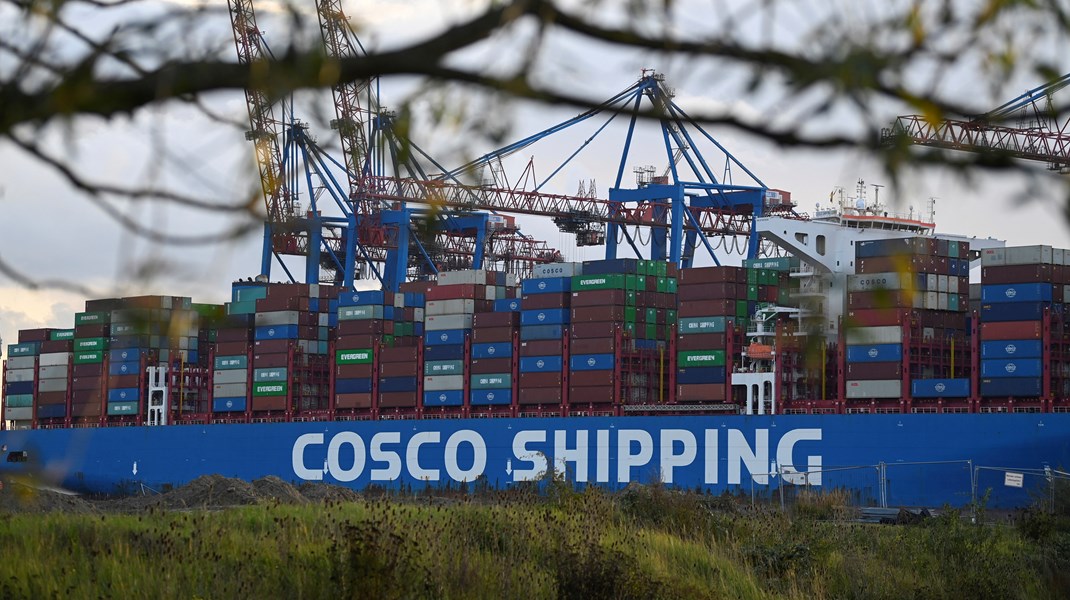Danske Havne med opråb til Scholz i Altinget Transport

Dette indlæg blev bragt i Altinget Transport d. 28/10/2022 og kan læses her.
Det var ikke godt, da Grækenland i 2009 udlejede havnen Piraeus, en af Europas vigtigste containerhavne, til kineserne.
Grækerne var økonomisk i knæ, og den daværende tyske kansler, Angela Merkel, gjorde det klart, at EU-hjælp var betinget af salg og besparelser. Så den græske regering greb muligheden og lejede havnen ud til Kina, som var meget interesserede i aftalen.
Det kinesiske rederi Cosco har i dag 13 år senere aktiemajoritet i den græske storhavn. Absolut ikke betryggende. Hverken Grækenland eller vi i Danmark deler sikkerhedsinteresser med Kina. Det gør Tyskland heller ikke.
Ikke desto mindre vender den tyske kansler, Olaf Scholz, åbenbart det døve øre til talrige advarsler mod at sælge væsentlige dele af den vigtige tyske Hamborg Havn til netop Cosco, det samme statsejede kinesiske rederi, som i dag ejer aktiemajoriteten i Athens store Piraeus-havn.
Undervurderede Rusland
Med fare for at lyde bagkloge peger vi på, at den tidligere tyske kansler Gerhard Schröder klart undervurderede Ruslands muligheder for, og vilje til, at bruge gasforsyninger som politisk våben. Det står vi nu med konsekvenserne af i form af en truende energikrise i hele Vesteuropa.
En ting er at være naiv, det har vi alle været i forhold til Rusland. En anden er ikke at lære at den fejl. Tyskland må i dag have lært, at afhængighed af stormagter, vi ikke deler interesser med, er åbenlyst farligt. Og skaber ustabilitet i livsnødvendige forsyninger.
Den tyske formand for EU-Kommissionen, Ursula von der Leyen, advarer klart mod Kina og maner til forsigtighed i forhold til “afhængighed” af landet.
Det tyske indenrigsefterretningsvæsens chef, Thomas Haldenvang, sagde utvetydigt til Bild for nylig, at Kina er langt farligere end Putin: “Rusland er stormen. Kina er klimaforandringerne”.
Så har man proportionerne.
Værn om kritisk national infrastruktur
Vi kan ikke bestemme, hvad tyskerne skal. Men vi vil som repræsentanter for de danske erhvervshavne godt advare klart mod, at man sælger den livsvigtige forsyningssikkerhed, som havne som kritisk national infrastruktur repræsenterer, til lande, vi ikke deler sikkerhedsinteresser med.
Forsyningssikkerhed både på energi- og fødevareområdet er om ikke forbigået, så dog besynderligt langt nede på listen i den politiske debat. Besynderligt, dels fordi det vedrører os alle sammen, dels fordi vi jo foruden en valgkamp også står midt i en energikrise, der netop handler om forsyningssikkerhed.
At et land har hånd i hanke med hvordan og af hvem, der produceres og leveres energi og fødevarer, er vitalt for både landets og borgernes tryghed og sikkerhed. Havne har en nøglerolle i den nødvendige infrastruktur til både energi og fødevarer. Omkring 75 procent af Danmarks udenrigshandel sker via en dansk havn.
Det er en væsentlig politisk opgave at værne om vores nationale kritiske infrastruktur, ligesom det er en national politisk opgave på alle måder at sikre netop forsyningssikkerheden. Herunder på alle tænkelige måder at hjælpe vores gode nabolande til også at træffe de sikreste beslutninger.
